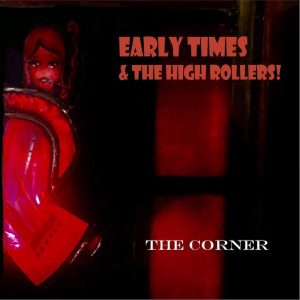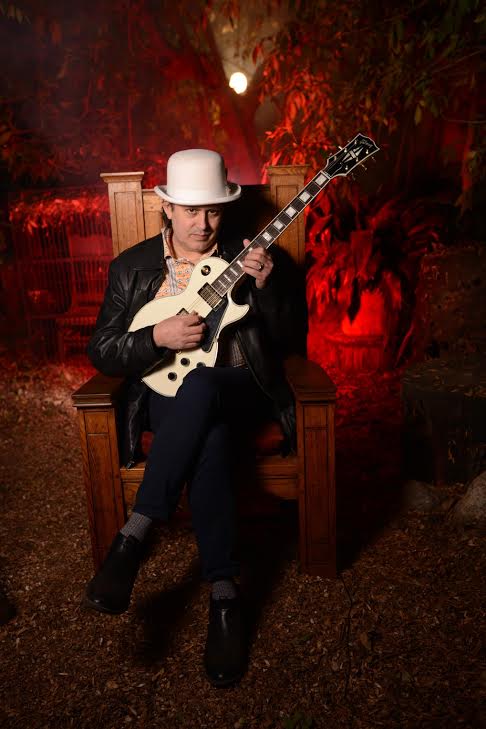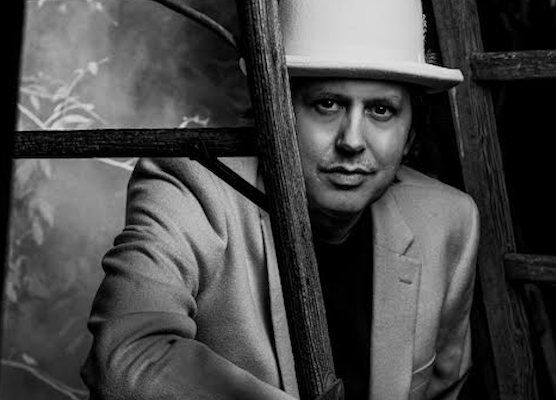Early Times grew up in Sacramento, CA and lives in New York. While in Sacramento, Early operated Fantasia Music, a record label that had international distribution through Bayside. He released Society for the Misunderstood (Best CD in Sac This Week); Hobo Deluxe (Best CD nomination Sacramento Area Music Awards); The Comedown (Best CD nomination Sacramento Area Music Awards); and Tickle Your Fancy.
During his time in Sacramento he received an unprecedented 10 nominations in the Sacramento Area Music Awards (Sammies), more than any other artist in the area. These nominations were for Best Rock Musician/Vocalist (multiple); Best Singer/Songwriter; Best Rock Band; Best Blues Band; Best Local CD (multiple); Early was also the recipient of the Critics’ Choice Award as Sacramento’s Best Guitarist.
Early went on to tour nationally and in Greece with E.C. Scott and played lead guitar on “Hard Act to Follow” and “Masterpiece” for Blind Pig Records. Lee Hildebrand’s (SF Chronicle) 4-star review of Hard Act to Follow declared: “Featured throughout is the scorching guitar work of a Sacramento musician by the name of Early Times.”
In 2001 Early helped usher in a new wave of broadcasting when he debuted on Sirius Satellite Radio. He hosted a daily show on Sirius Blues from the channel’s opening until its closing. During the 7+ year span, he welcomed guests such as Buddy Guy, Elvis Costello, Allen Toussaint, John Hammond, Jonny Lang, and more.

Early Times operates Manhattan Recording and Dealer’s Choice Records out of his New York studio. There, he recorded his latest CD, The Corner, which was produced by Jay Messina. He signed a deal with Vizztone Records who released the album and it is being distributed by Redeye.
He also released Hit & Run, an album that featured the hit “Dogs of Karma” that ran in heavy rotation on Sirius XM.
In 2016, Early was once again asked to return to broadcasting and join the staff of BB. King’s Bluesville on Sirius XM Radio. He hosts a daily program from 3pm-9pm eastern time Monday through Friday and Saturday & Sunday from 6pm to midnight eastern. Among the guests on his show include: George Thorogood, Kenny Wayne Shepherd, Bobby Rush, Popa Chubby, Jimmie Vaughan, and more.
Can you talk about your songwriting process for your new album The Corner?
The way that I write songs starts with the seed of a lyrical idea that I want to write about. Once I have a little spark, I can turn it into a song. I wait for the initial line, theme, and title. When I write songs the storyline needs to speak to me. I decided to follow the muse where it took me. In some ways it is challenging to do this because you are thinking about the storyline almost like a script where there is an arc. It is inspiring too because it gives you a direction as to where you want to go with the songs. I start with the lyrics and generally do not start with the music.
Occasionally, I come up with riffs on the guitar, bass, or even the drums. I file and put them in the back of my mind so that when I start writing, I have some ideas. I also record into my phone so I don’t forget ideas.
Do you have a favorite song from the record?
I don’t have a favorite song from the album. There are different moods to the songs and as you know sometimes you listen to certain artists because the mood they created is how you want to feel at that moment.
I wouldn’t say that I particularly have a favorite. There are reasons I like each song; It could be the storyline or it could be the groove itself. I really like the groove on the song “Do What She Do.” It is hard for me to pick one as it would be like picking your favorite child.
My favorite song is “On The Corner,” and I am curious if there is any Doors or Jim Morrison influence?
That is a totally valid question, and I am glad that you like that song. It is the title track to the album. It paints the picture to the scene that I am trying to create or I should say recreating in a way. There was no Doors or Jim Morrison idea or feeling when I was writing the song. I think when we added the Farfisa organ, it takes you into that sixties Doors kind of mode. The organ is very subtle and not that loud in the mix. I think it contributes to giving it the distant kind of Doors vibe. I sing it in a lower register so I can see where the Jim Morrison vibe comes in. It wasn’t anything that was conscious. Sometimes you can’t escape it if you put a certain instrument or sound on a song.
For example, if you put a talk-box guitar on your song you are going to get the comparisons to “Rocky Mountain Way” by Joe Walsh and “Do You Feel Like We Do” by Peter Frampton. When you use certain keyboard sounds it gets close to the sixties kind of vibe. Having said that, I think The Doors were as good of a band as there has ever been. They were one of the most unique bands and a band that came as a counterpunch to what was happening in the Los Angeles area with The Beach Boys and the surf sound. They turned the whole thing on their heads. They were expert musicians for young guys. Ray Manzarek’s keyboard solos still hold up all these decades later. His solos were imaginative. In my opinion, there was high quality musicianship in that band.
Can you talk about your radio gig on B.B. King’s Bluesville on Sirius XM?
For me, being on the radio was an accident and something that I didn’t pursue. Although I did joke with friends when I was in high school in California that one day I would have a blues radio show and live in New York. Such a thing didn’t even exist then. When satellite radio was first getting formed there were two companies. There was Sirius and there was XM. The person who was hired to run the blues channel at Sirius saw something in me that he thought would translate well to radio. I had been playing and touring with a singer named E.C. Scott from Oakland. I think he knew that I knew the history behind the music. He saw something in me and he gave me my break. The channel at the time was called Sirius blues and I did that for the entire run until the merger happened with XM. I was off the air for a few years.
When the merger happened a lot of us were laid off due to cost cuts and what not. I moved on with my life doing other things. A few years went by and I received a call and was asked if I wanted to come back on the air. At first I turned it down and they called me again. I then said I would do it. It is really a great gig. I enjoy the work and I enjoy the history of the music. I feel a certain responsibility like holding something that is very sacred and it needs to be treated as such.
I really try to know the history and I try to know the musicians as well so that I can get information and behind the scene stories that you cannot find online. There is the old saying that radio is theatre for the mind. As an on-air person, you have to create the pictures that people are going to see in their mind as they are listening on the radio. It is effective to have a great story about a song or a session that you can’t find by Googling something on the internet. The blues is as important as any artform.
Do you hear any influences when you listen back to your new album?
You should always listen to music for its aesthetic qualities, but you also need to devote some time to listen critically. As far as my influences for ‘The Corner’ there are so disparate that it is hard to pin it down. I hear all of my influences in my music. With some musicians you can tell if they listened to a ton of Jim Hendrix or Stevie Ray Vaughan. It is very obvious. With my music the influences are buried in a little more and are more subliminal. Usually, they are not right out front. To give you an idea, I love blues all the way back to the 1920s. I love the Delta stuff and the rural Texas players. Everybody usually thinks the earliest blues is from the Mississippi Delta, but Blind Lemon Jefferson was recording in Texas before a lot of people started recording as did Texas Alexander. There is also the whole Piedmont area which is the southern east coast. As far as blues, I like all of it.
What I don’t like are guys that just want to play guitar solos for every single song and the song becomes secondary. Most guitar players thinking this way are not imaginative enough as players to hold my interest for any length of time. I think the guitar playing should serve the song opposed to the other way around. If you listen to ‘The Corner’ I think this comes through. The songs come first. I have been a guitar player for a lot of years and people do expect and want some guitar playing out of me. I feel I have poured plenty of guitar work onto this album without it being a guitar album.
Also, I spent a lot of time learning how to play Jazz; all the old standards and Bebop. I learned all of it and I have played many gigs doing straight ahead Jazz. It has helped me with harmony and how to add melodies to harmonies. Even if I am writing a song with more of a blues pop sensibility I know what chords I can throw in to take the song in a different direction without sounding too heady or brainy. To give you an example, if you listen to the bridge section on “He’s Got a Jones,” it is in different keys. The melody fits and doesn’t sound strange like I am trying to force something in. When you have a good grounding of melody and harmony together, I think you can throw in Jazz influences without it throwing the listener off.

How has your music career been impacted by the pandemic?
For a lot of years I have been tied to the radio, so I haven’t been able to tour. Having said that, I have been able to record my show remotely. I think it’s going to be a blessing in disguise for me. I believe that I will now be freer to tour. I just booked my first post pandemic show on Monday June 28th at the City Winery in Manhattan. I am going to be opening up for Bobby Rush. Bobby is a wonderful guy and on a side note our two real elder statesmen in the blues world are Bobby Rush and Buddy Guy. We are super lucky to have them and they are still around, still touring, and still staying fresh. They are such positive people. Bobby won the Grammy award this year.
I am really looking forward to the show and using it as a springboard. Regarding the pandemic, agents aren’t really ready to take anybody on right now. I have reached out to some agents but there haven’t really been any shows. They need to make up for lost time with the artists they already have. I am going to have to beg, borrow, and steal my gigs until I can really get with a good agency. I grew up booking my own shows and selling cd’s from the trunk of my car. I do have distribution and a record label for the new album. You have to be hungry in this business to stay relevant and I try to stay hungry with everything.
What else do you want to accomplish?
That is a question that goes around in my mind. I am trying to figure out how I am going to follow up ‘The Corner.’ That is my immediate goal. I need to figure out the next album and then I have to create it. It is a challenge. I try to stretch the boundaries. Every song that I write I hope has something special to it. I need to figure out what it is going to be. I really need to start establishing a touring base.
I used to tour but I have been tied to the radio station for a lot of years which means I have to be in NYC which is not a bad place to be. I have to build my base around the country. There is an investment. When you start touring you lose money. You have to believe in yourself and bring a quality product. When I think about great band leaders, I think about James Brown and Frank Zappa. They didn’t play around and they were so tight. They brought it every night. That is what I need to make sure I do. I need to bring that professionalism.
Early Times
*Feature image credit: Edward Colver

